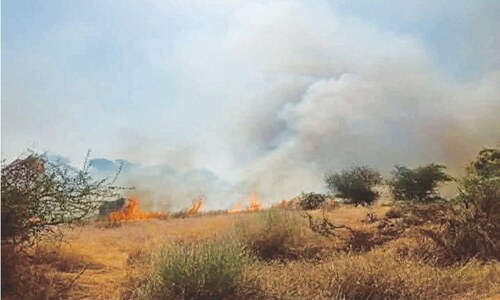ISLAMABAD: Minister for National Food Security and Research Tariq Bashir Cheema announced on Wednesday that there was no shortage of wheat as all the provinces had sufficient stocks, but they were not releasing the staple.
Speaking at a press conference, he said there was not only no shortage of wheat in the country, but the position of strategic wheat reserves was also satisfactory.
He said the federal government imported wheat to supply to provinces and “we will meet the demand of provinces if they approach us”.
Mr Cheema said there were enough strategic wheat reserves to meet the demand of Afghanistan, but he warned that the federal government would not allow the smuggling of the commodity to any country and if any country needed wheat, it should approach the federal government.
Minister warns against smuggling of wheat to any country
He blamed the Punjab government for the wheat crisis, saying the provincial government had failed to meet its procurement target for the year, and it had now approached the federal government to meet the shortfall. The Punjab government should provide mills in Islamabad with the required wheat stocks.
The minister said he would propose to the prime minister to allow the Pakistan Agricultural Storage and Services Corporation (Passco) to release wheat to flour mills in Islamabad to bring down the rising prices on the market.
The daily requirement of 40 flour mills in Islamabad was 38,000 bags of 20kgs, but the Punjab government was not providing enough wheat to mills in Islamabad and there was a shortage of 17,000 bags per day.
Since the flour mills were buying wheat from the open market to meet the shortfall, the price was rising, Mr Cheema said.
“There are 38 sale points in Islamabad from where the government is supplying wheat flour at a low price to provide relief to people,” he said.
Mr Cheema further said that flour mills were grinding wheat at less than their capacity across the country which was resulting in artificially inflated price of wheat flour. The provincial governments should take action in this regard, he said.
Lack of coordination
He said there was a lack of coordination among the provinces in the announcement of minimum support price for the 2022-23 wheat crop, adding that the Sindh government had set wheat support price at Rs4,000 per 40kg which was very high.
He expressed the hope that the issue would be resolved soon during a meeting between Prime Minister Shehbaz Sharif and Foreign Minister Bilawal Bhutto-Zardari.
The minister said that after the 18th Amendment, prices of all essential items were controlled by provincial governments.
“The provincial governments should take responsibility and take measures to ensure food security of essential items and control prices. After the NFC Award, provincial governments had the financial resources and “if they can enhance their procurement targets, then they should do it”, he said.
Mr Cheema said that rules did not allow import of GMO food products since they had harmful effects on health. “Before 2015, GMO soybean was not part of poultry feed and there are alternatives available,” he added, adding that the import bill of oil seed was expected to be $6 billion this year, and emphasised that provinces should promote oil seed cultivation to reduce the burden on the exchequer.
NA panel meeting
In a related development, Secretary of Ministry of National Food Security and Research Zafar Hassan informed the National Assembly Standing Committee on National Food Security that on the directive of the federal cabinet, public wheat stocks had been re-verified and a net shortfall of 2.6 million tonnes had been reported by provincial food departments.
He said the federal cabinet had allowed import of 2.6m tonnes by the Trading Corporation of Pakistan through open tendering process as well as under G2G arrangements at the lowest offer. The committee was informed that 1.224m tonnes of wheat had reached the country while the remaining quantity would arrive by the end of March.
The standing committee meeting, chaired by MNA Rao Muhammad Ajmal Khan, was further informed that a committee had been formed by the prime minister for implementation of the Kissan Package 2022. After the ratification of all 15 schemes by the cabinet, the ministry has officially notified the package.
The pending issue of fixing electricity charges for tube-wells at Rs13 per unit had also been approved by ECC, the secretary further informed the committee.
Published in Dawn, January 5th, 2023















































Dear visitor, the comments section is undergoing an overhaul and will return soon.